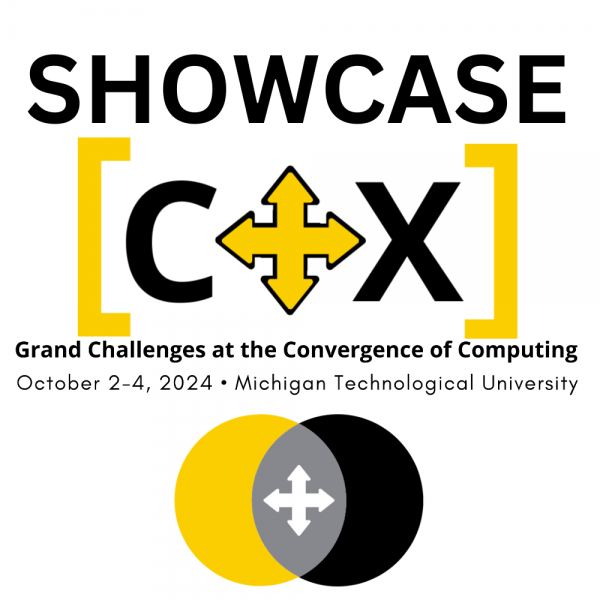
The Fall Computing Showcase is back and is right around the corner! This year’s iteration is dubbed Showcase C+X.
The theme of this year’s iteration focuses on the convergence of computing (C+X) and how computing technologies pervade into nearly everything, from biomedicals to environmental conservation, and enhance research and education.
Showcase C+X will continue to host impactful speakers and talks as well as a student poster competition. However, some new and exciting facets of this year showcase include the official Center for AI rollout reception as well as another AI Art Workshop, to commemorate the recent launch of the Center for AI.
Mark your calendars for October 2-4! The full event schedule is located here: https://www.mtu.edu/icc/events/computing-mtu-showcase/showcase-cx/schedule/
by James Thompson, Institute of Computing and Cybersystems
Showcase C+X Event Speakers
Keynote Speaker – Dr. Shankar Subramaniam
“Shankar Subramaniam is a distinguished Professor of Bioengineering, Computer Science & Engineering, Cellular & Molecular Medicine, and Nanoengineering, and Joan and Irwin Jacobs Endowed Chair in Bioengineering and Systems Biology at the University of California San Diego. He was the founding Director of the Bioinformatics and Systems Biology Interdisciplinary Program. He was named a distinguished scientist at the San Diego Supercomputer Center in 2010. He is a Fellow of the American Institute for Medical and Biological Engineering, American Association for the Advancement of Science, and is a recipient of the UCSD Chancellor’s Award for Research Excellence, and Genome All Star, Smithsonian Foundation and Laboratory Automation awards. Subramaniam received a Ph.D. from the Indian Institute of Technology.” – USCD
Dr. Markus Buehler –
“Markus J. Buehler is the McAfee Professor of Engineering at MIT. In his research, Buehler pursues new modeling, design and manufacturing approaches for advanced biomaterials that offer greater resilience and a wide range of controllable properties from the nano- to the macroscale. His interests include a variety of functional material properties including mechanical, optical and biological, linking chemical features, hierarchical and multiscale structures, to functional performance in the context of physiological, pathological and other extreme conditions.” – LAMM MIT
Dr. Jim Keller –
“James M. Keller is now the Curators’ Distinguished Professor Emeritus in the Department of Electrical Engineering and Computer Science at the University of Missouri. Jim is an honorary professor at the University of Nottingham. His research interests center on computational intelligence: fuzzy set theory and fuzzy logic, neural networks, and evolutionary computation with a focus on problems in computer vision, pattern recognition, and information fusion including bioinformatics, spatial reasoning in robotics, geospatial intelligence, sensor and information analysis in technology for eldercare, and landmine detection.” – University of Missouri
Dr. Steve Jones –
“Steve Jones is a Distinguished Professor of Communication at the University of Illinois at Chicago and Adjunct Research Professor in the Institute of Communications Research at the University of Illinois at Urbana-Champaign, Jones’ books have earned him critical acclaim and interviews in national and international media. A co-founder of the Association of Internet Researchers, he has made numerous presentations focusing on the Internet’s social and commercial uses, and social changes in the Internet age.” – UIC Comms
Dr. Claudia González-Vallejo –
“Dr. González Vallejo is serving as Program Director in the Decision, Risk, and Management Sciences, Division of Social and Economic Sciences, Directorate for Social, Behavioral, and Economic Sciences of the National Science Foundation. Dr. Gonzalez-Vallejo’s research focuses on understanding how people make decisions as well as on the factors that affect people’s judgments. She is primarily interested in choice behavior (preferences). Her work on choice behavior uses a stochastic model that she developed to investigate how individuals make trade-offs among characteristics of the options to be selected.” – University of Ohio